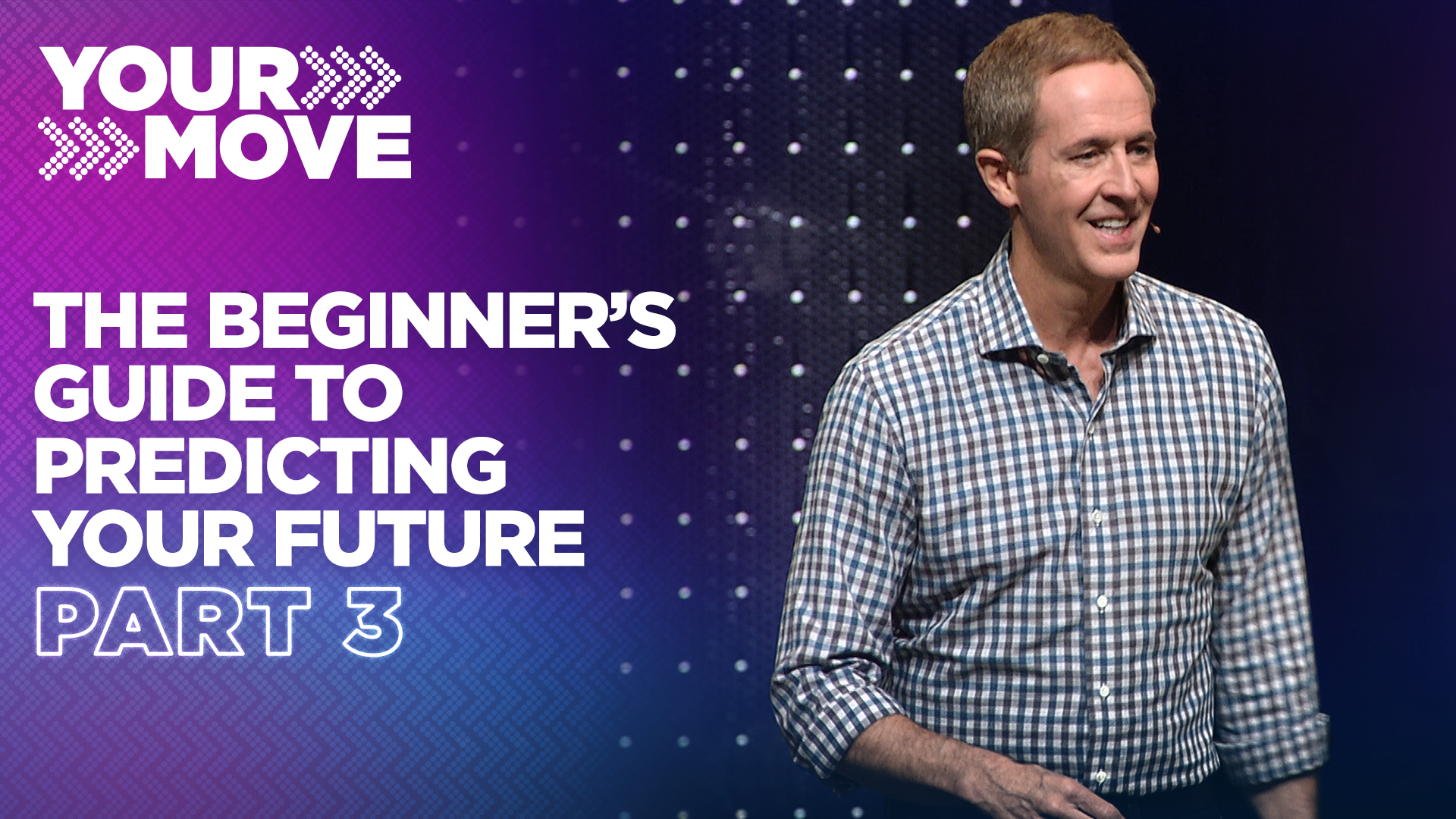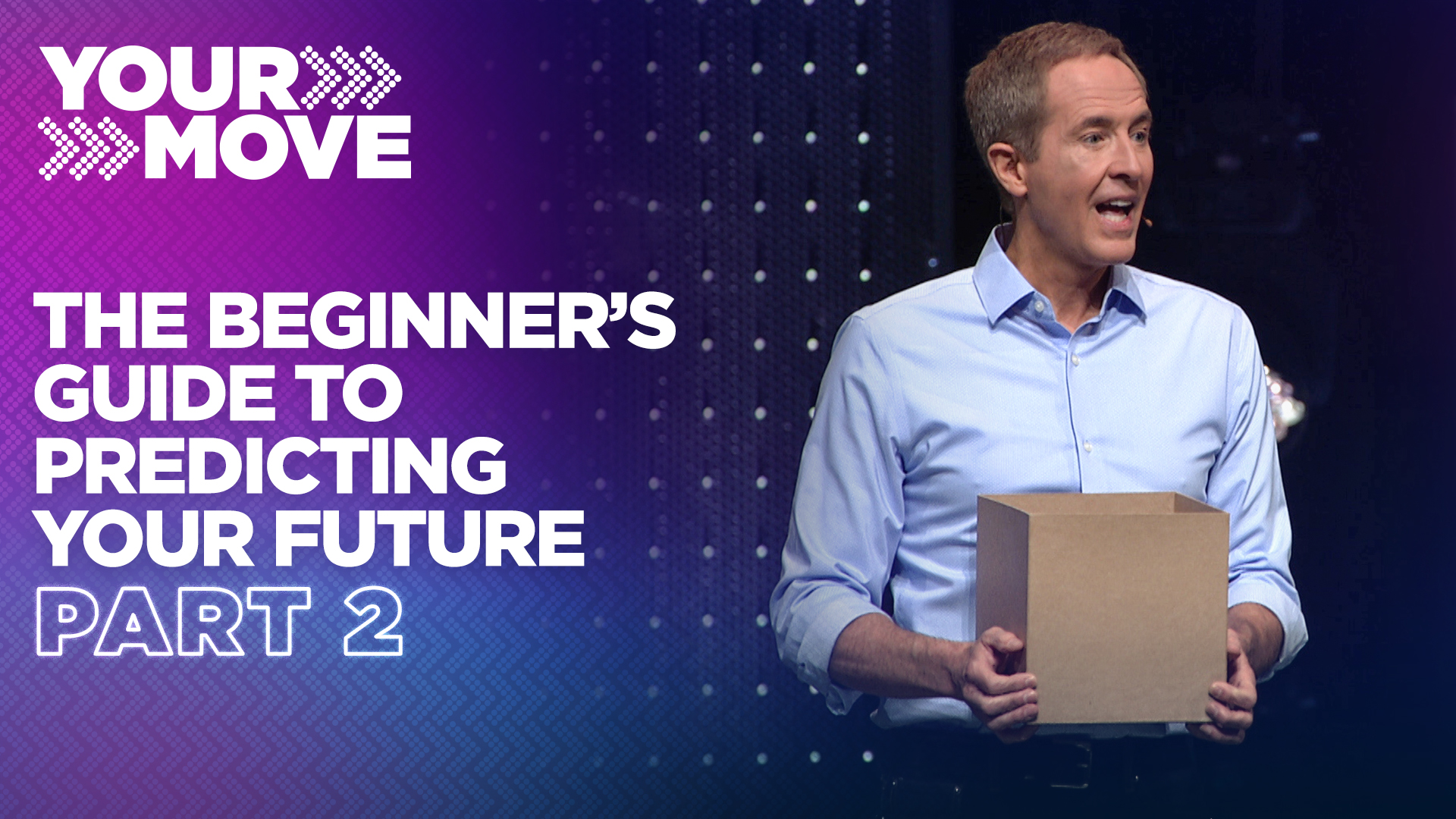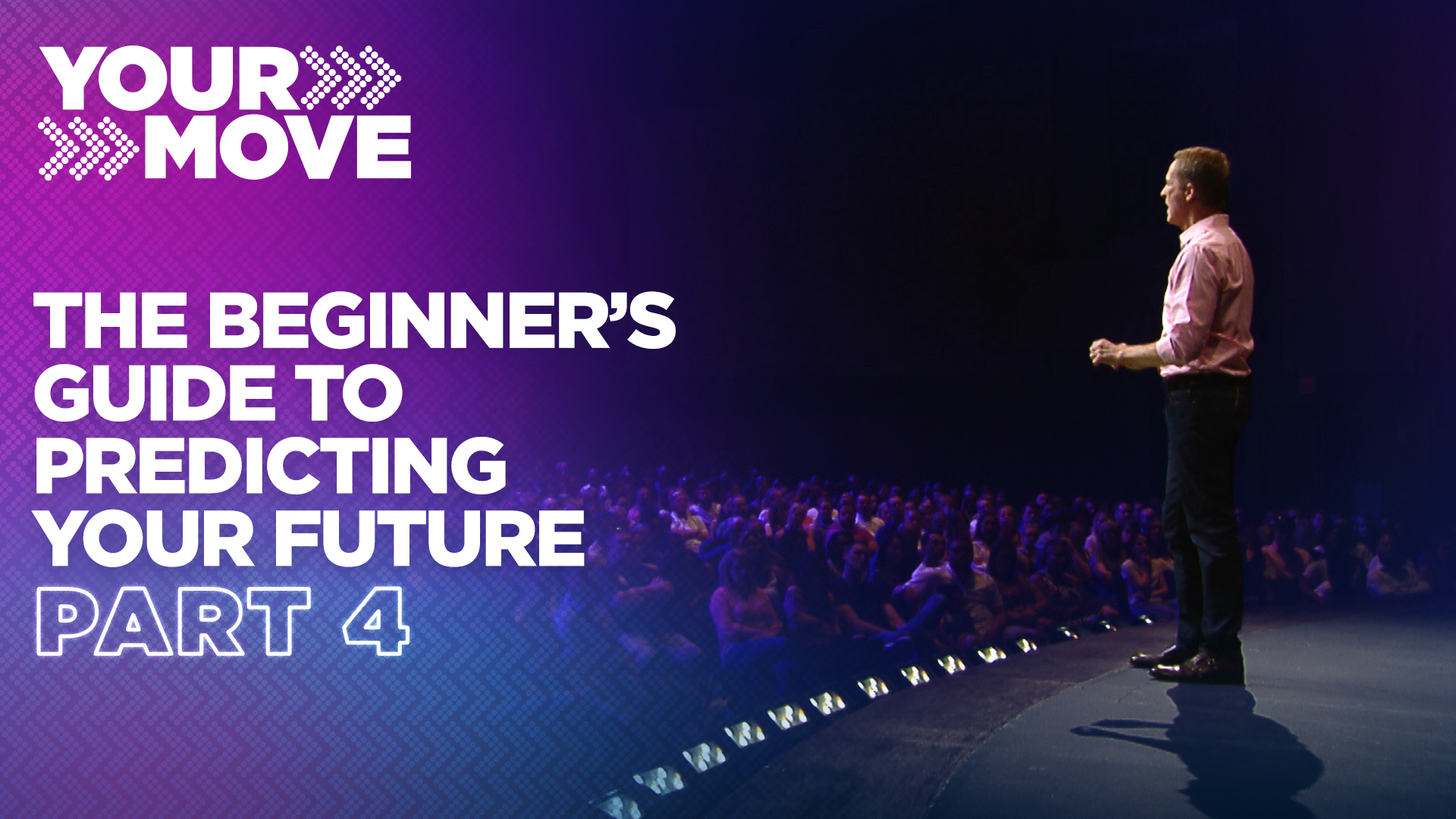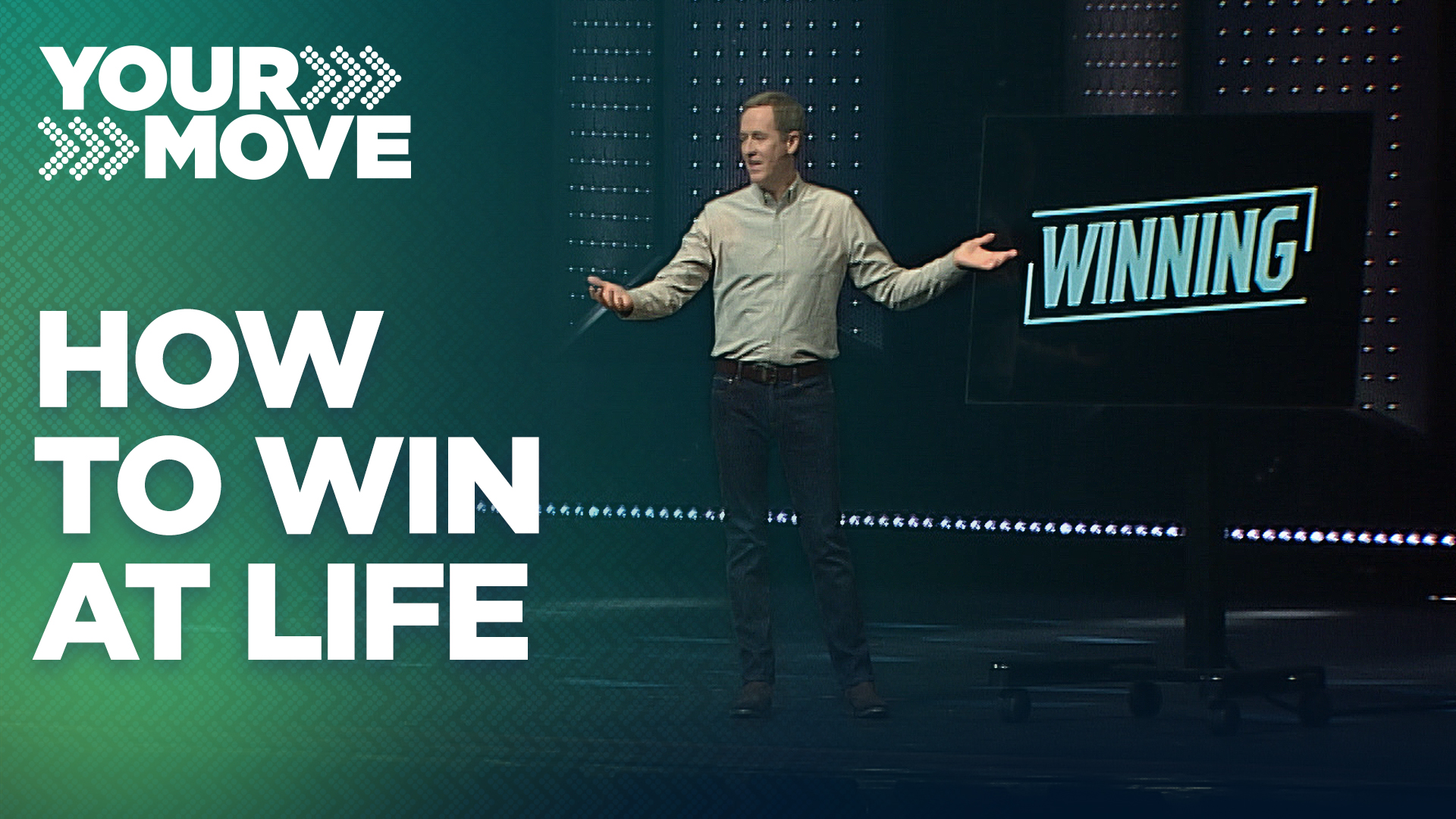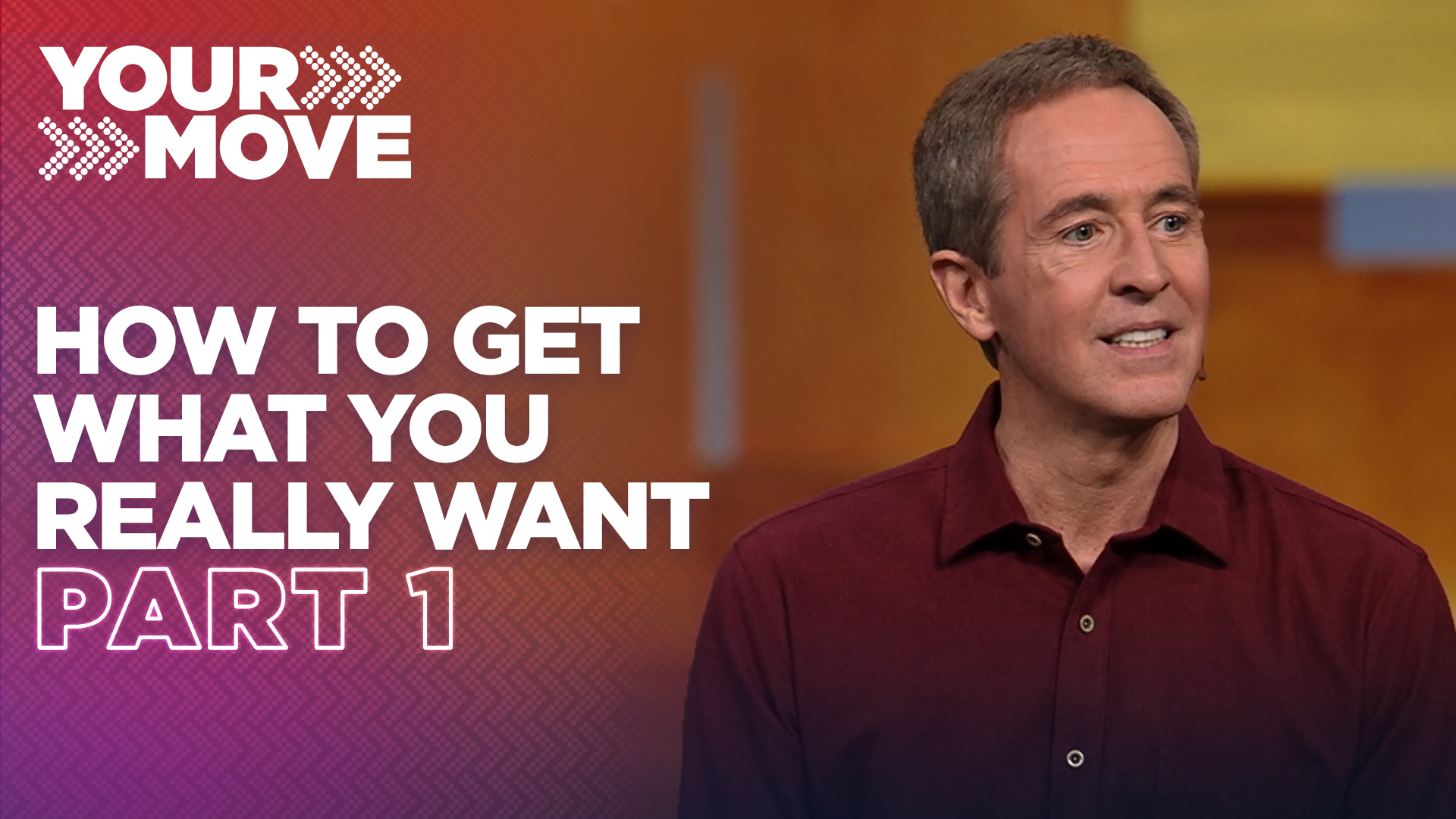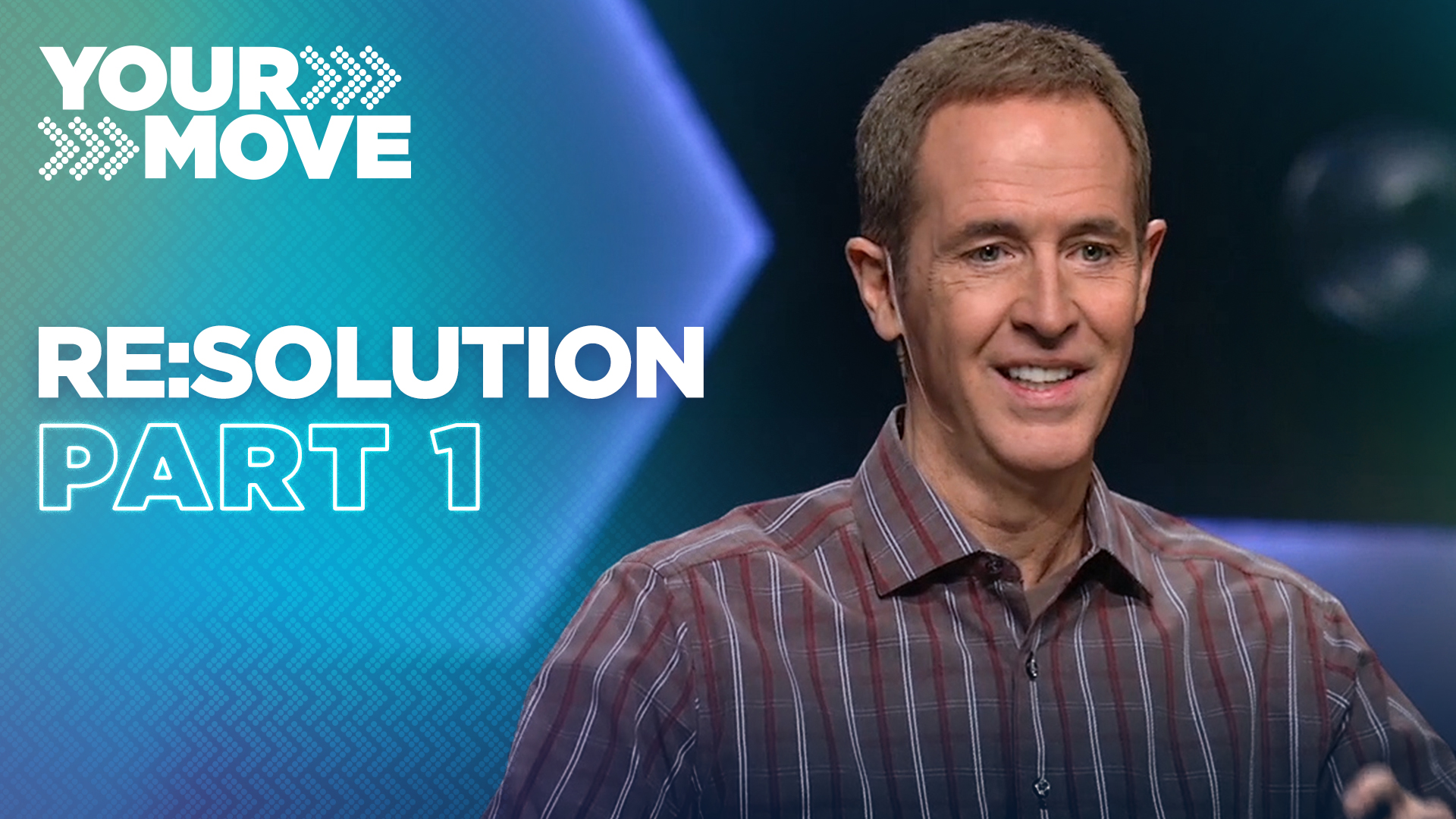We all end up somewhere in life. Why not end up somewhere on purpose?
- Think about a time when you found yourself saying, “I should have seen this coming.” Which decisions led to that moment?
- Andy mentioned Jesus doesn’t offer a fix, he invites people to live in a different direction. Why do you think we tend to crave a quick fix?
- Think about one area of your life (e.g., relationships, career). Can you predict where your current decisions are taking you in this area? Is it somewhere you want to end up?
- What steps could you take to change directions in an area of life you would like to improve? What stands in your way?
NOTE: The following content is a raw transcript and has not been edited for grammar, punctuation, or word usage.
What if you could predict your own future how amazing would that be?
The good news is most of you have gotten really close before to predicting your own future. Here’s how I know that, because at some point in your life, you have had this thought or you’ve uttered this statement under your breath, or perhaps you forgot what you were doing and you said it out loud in front of someone. And here’s the statement that lets you know that you have gotten closer than you think, to predicting your own future. You said this, thought this, or muttered this, “I should have seen this coming.”
I should have seen this coming, I should have predicted my own future.” And all of us have had these seasons where we find ourself in a mess, and when the mess finally hits us in the face and when the mess is kind of all over the room, and when the mess like upon us, we think to ourselves, we think back, we begin mentally to connect all of those dots and we conclude, “I don’t know why I’m surprised, I should have seen this coming. It’s just so obvious. I should have seen this coming.”
Now, here’s something that you have said out loud, not about yourself but about someone else. And this is how we know that we can actually, even if we don’t wanna predict our future, we know how to predict the other people’s future, right? You’ve said this, “You should have seen this coming, [laughter] you should have seen that coming.”
I mean, you’ve said this to friends, maybe a roommate, hopefully not your spouse, you hope somebody else would say that, right? Because this isn’t a good night in a marriage, when you say this but you have friends that are making decisions and it’s like you’re watching a train wreck in slow motion, you’re watching people come down to sidewalks into a corner, they’re about to collide. You can you can see what’s about to happen. And you’ve tried to say something. We’re gonna talk about that in week four. Or somebody else’s tried to say something to them. And then finally, you know what everybody knew was inevitable finally happens, and they’re so shocked like, “I can’t believe he broke up with me,” really? He has been breaking up with you for three months. Everybody knew he was breaking up with you, but you. You know, “I don’t know how I got this much debt.” Oh really, everybody that knows you. This is not a mystery to anyone, but you. And you were able to predict their future. But here’s the question, here’s the mystery here’s what we’re gonna talk about.
Why is it that you can see what they can’t see and why is it that they can see what you can’t see? And then there’s this, because this is sort of the crazy part of this. Sometimes we do see and we just don’t look. Sometimes we kind of know where this is headed. And every once in a while, somebody drops a hint or two and every once in a while, circumstances drops a hint or two. And instead of facing it, “Oh no, look where I’m headed.” We instead just sort of look the other way and refuse to look. And then when we finally arrive at the destination, we act so shocked and surprised. But the truth is, you kinda saw this coming. You kinda knew.
You have the ability. I have the ability in more cases and in more instances and in more arenas of life that we want to admit. We can in fact predict our own future.
Now in terms of why we’re so prone to do that we’re gonna get to that in week three, we’re gonna talk about that later. But first, I need to give you some bad news and a little bit of good news. And this actually might explain why you’re experiencing what you’re experiencing in life today. And this will also discourage you, and you will be tempted to turn off the computer, the television or just get up and leave, so don’t leave early, but here’s kind of gently give you the bad news.
Most of your personal problems, most personal problems cannot be fixed. Yeah, I didn’t think I would get like a, “Oh it’s great.” Yeah, most [laughter] personal problems cannot be fixed. And here’s why. This is so important. You fix a car, you fix a computer, you get the oven fixed, you get the lawn mower fixed, you get dogs fixed, that’s a completely different thing. And you get all kinds of things fixed and when you finish fixing, they’re as good as new. It’s like they’re almost brand new, it’s like it never even happened.
I don’t need to tell you this, but in light of where we’re going, I’ll say it anyway. You’re not like a car and you’re not like a computer.
Okay, your computer has memory. But you have memories. You are more complex. We are more complex.
Now, and in terms of our personal problems we can cope with them, we can overcome them, we can leverage them to teach our children later. but our past is our past and it follows us around and it’s part of our story for the rest of our life. So that’s the bad news,
But here’s the good news, and here’s where we’re going for the next few weeks. The good news is most personal problems can be avoided. And this series is about avoiding what can be avoided so there’s less to cope with later. It’s about avoiding the things that can be avoided because there’s enough pain in life that can’t be avoided.
Why in the world would we bring extra upon ourselves unnecessarily?
And at the center of this entire series, is a single principle, is a single principle that I call the principle of the path. And I’m gonna give you the principle of the path at the very end of the message today.
But first, I wanna talk a little bit about this word because this is very important for where we’re going,
A principle is not a rule that you follow. A principal is not a rule that you follow. Actually a principle follows you. Principles follow you around everywhere you go even when you’re not aware of them. A principle is not something that you choose to apply. In fact, the difficult thing about a principle is a principle applies itself to you even when you’re not aware of it.
And principles are very, very, very sticky. They will stick to you regardless of when you know, regardless of whether or not you know they’re there or what’s going on.
And a principle, and this is where we’re going a little bit today. A principle is not a law or a rule that you can break. But if you ignore certain principles, principles will break you.
You recognize them and then you get to make a decision. You can leverage a principle to your benefit or you can ignore a principle to your demise.
And all of this is true for the principle of the path, the principle of the path.
Now to fully appreciate this principle, I have to say, one other kind of setup before we get into the meat of this.
It’s called the principle of the path, it’s not called the principle of the solution, and there is a difference between a path and a solution. When you are lost, you do not pull over and ask for a solution, you pull over and ask for directions.
Because when you’re lost, when you’re lost, we need to know where we are and we need to know how to get to where we want to be, and you know this, there is no instant fix and there is no instant solution for being lost. We get to where we need to be, we get to where we should be the same way we got to where we shouldn’t be. This is something we don’t like and we don’t like to acknowledge. So I’m gonna read it again.
We get to where we should be financially, in your marriage, with your kids, with your parents, academically, whatever it might be, professionally, we get to where we should be actually the same way we got to where we shouldn’t be.
And we get there, not through a solution, we get there through direction.
Now, all over the country, this week and all over the world, probably this week, people will go to see a pastor or to see a counselor or a psychiatrist, and they will go to see the pastor, or counselor, or psychiatrist, and they will go in there with problems that they want the counselor, or the pastor to fix. I need a solution, I wanna be fixed.”
But the truth is, and every wise pastor and counselor knows this, even though we don’t hear this, is that there’s no fix because these are problems that can’t be fixed. We don’t need to be fixed, we need a direction to be changed, we need to change directions. And even though you didn’t have this terminology, intuitively you know there’s nothing you can do and there’s nothing you can say. There is no fix for this, you’re not made that way. You need to move and to live in a different direction. These are people who are living in the wrong direction.
Now, if I can just be personal, some of you may be living in the wrong direction. And the interesting thing about living in the wrong direction and the interesting thing about the principle of the path is this, you can be living in the wrong direction, and be happier than you’ve ever been before. You can be living in the wrong direction, moving in a direction that will take you where you don’t wanna be and have no idea. Isn’t it true that when you’re driving and you get lost, you’re not sure exactly the moment that you became lost?
And this is why I’m so glad that you’re listening or watching here today, it’s possible, it’s just possible that you are lost, that you are moving and living in the wrong direction and you don’t know it, because the consequences of your decision haven’t settled in yet. And then when you discover it, you’re gonna want a fix, you gonna want a solution. And the wise people around you are gonna say, “You don’t need a fix, or a solution, you need to change direction.”
Now, the other thing is, you may be living in the wrong direction and things aren’t going all that well. They were for a while. She’s the greatest, he’s the greatest. This is the dream job. You know, I know it’s not exactly ethical, but it’s all gonna work out. People do this all the time. and now it’s starting to get a little wobbly. Now it’s not quite so much fun. Now there seems to be problems and you’re thinking, “I need to get this fixed, I need to get this fixed.” No, you’re living in the wrong direction. And here’s the good news. If you change direction, things will eventually change.
Now, no surprise, and this shouldn’t come as a shock. Jesus [chuckle] actually talked about this.
These words of Jesus are so powerful because He points to the principle of the path, but He does it in a different way, He does it in a parable. And He preaches a sermon that we call, and in the Bible is called the Sermon on the Mount. And it’s a sermon that I think He repeated dozens of times. I think this is His go to sermon.
And so at the end of this particular version of the Sermon on the Mount, that’s recorded in the gospel of Matthew, Matthew, is one of Jesus’ apostles and Matthew was either a scribe or because he was the tax gatherer, he had scribes so they got all the stuff written down. And so in the gospel of Matthew, we have this full account of the Sermon on the Mount and at the very end, after Jesus is covered, I mean everything you can imagine.
He essentially tells this parable, and in this parable He delivers to us sort of the essence of this principle of the path.
So here is Jesus, He’s wrapping up, He’s at the very end of this incredible message, here’s what He says, “Therefore,” because he’s at the end, “Therefore, everyone who hears these words of mine and actually does them,” not listens to them, and goes. “Oh, you are right, I’m not gonna do anything with it, but… Oh, you’re right.”
Now this is a big deal for some of you because for some of you, the most religious experience you have is going to church and feeling bad about yourself and going home. That is religion for you.
Jesus said, “I want you to actually do what I’m asking you to do.” And He continues, He says, “Anyone who hears these words of mine and puts them into practice will experience immediate relief, relational, financially along with all the other … ally’s.”
It’s not what He said. “And Therefore anyone who hears these words of mine and puts them into practice will have discovered the fix for all their problems.” No, because Jesus never ever promises a fix for a problem. And Jesus, this is why you should follow Jesus. Jesus never does that. He doesn’t promise a fix, He doesn’t promise a solution, He invites people to live in a different direction.
He points the way forward, He points the way out. So here’s what He actually said. He said, “Anyone who hears these words of mine and puts them into practice is like a wise man.” Not necessarily a smart man, but he may be smart, not necessarily a talented man, but he may be talented, and not necessarily a resourced man, although he may be resourced. A wise man. And what is a wise man? A wise man or a wise woman is someone who understands, and we’ve talked about this before, that life is connected. That life is connected, that the past is connected to the present. And the wise person understands that the past is connected to the present, and the present is a good predictor of the future. The wise person understands that you really can predict, to some extent, your own future. That direction, your current direction, is a great indicator of your ultimate destination. That’s how the wise people think.
“So if anyone hears these words of mine, puts them into practice is like a wise man who built,” this is a process. You ever built anything? And most of us, if it’s gonna take more than an hour, we try to find somebody else to build it for us, right? A wise man who built, built. That means process, time. This relates to habit, repetition, discipline, something we really don’t like, delayed gratification. If you’re gonna build a house, you have to wait until you finish the entire process. “Who built his house.” In the context of this parable, a house is like a life. It’s your relationships, it’s your money, it’s your pastime, it’s your pleasure time, it’s everything that has to do with anything that’s important to you that’s part of your life. The wise man is like someone who listens to what Jesus said, and actually puts it into practice, it’s like somebody who’s building his house.
And then he makes a statement that we can’t relate to at all, “Who built his house on the rock,” to which we think… We don’t know what that means, because we don’t really build houses, and we don’t build on rock. But in this first century context, this represented something very specific, and everybody in Jesus’ audience immediately understood what Jesus was talking about. This represented the hard way, this represented the expensive way, this represented the time consuming way, this represented the way where there would be no immediate return on the labor, And then He tells us about a second character. You’ll remember this if you’ve heard this story in church, “But everyone who hears these words of mine and does not put them into practice is like a foolish man.” Now, what is a foolish man? A foolish person is somebody who lives as if life is disconnected, that now is now, and later is later.
The way that a foolish person thinks is this, If something happens to that relationship, if something happens to my relationship with my daughter, or if something happens in my marriage, if something happens financially, if these things happen that you think are gonna happen, although they’re not gonna happen, I’m like an electronic device. All I have to do is unplug myself, count to about 10, [laughter] then I plug myself back in, and I reboot and I start over, and I’ll be fixed and I’ll be fine.” To which we think, “That’s not how life works, but that’s how perhaps you’re trying to live.”
And your Heavenly Father who created you says, “You’re not a car, you’re not an oven, you’re not a toaster, you’re not a computer, you’ve been made in my image. You are complex and you are precious. And there’s no fix, there’s no solution, but I’m inviting you to change directions.”
“Who built his house on sand.” Which of course, again, we’re like, “That doesn’t mean anything to us.” This was the quick way, this was the easy way. And by the way, when Jesus said this, everybody in His audience moan like, “Oh, that’s not gonna go well.” And the assumption of the fool is this, the assumption for the fool is this. That today’s weather will be tomorrow’s weather. And it rarely is, it almost never is. And in this case, it wasn’t. Jesus says that the rain came down, the stream rose, and the winds blew and beat against that house, and it fell with a great crash.
The implication is, there’s no fix. “Hey, can you fix this?” “No, we just have to do what you should have done to begin with, we have to rebuild. It’s gonna take time.” “No, I don’t want you to take time, I want you to fix it.” “No, no. See, when the house fall down, you don’t fix it, you rebuild. It’s gonna take time. In fact, if you had taken the time upfront to do what you should have done, we wouldn’t be spending time now doing what we wouldn’t have to do.” “There’s only loss.” “Hey, you should have seen this coming.” But when the rain came down, the stream rose, and the wind blew and beat against that first house, the one built on the rock, Jesus says it did not fall because those folks are so lucky. [laughter] You know what we think? “Oh man, things just always work out for him, things just… You’re just so lucky, things just work out for you. Not me, I don’t think God loves me. I don’t even think God knows I exist. Things just don’t work out for me I don’t think God loves me.”
Jesus says, “Come on. Come on, you know how the world works. My Father made it to work this way, My Father made it to work this way so there would be some predictability, so that you would have a little bit of control, so that you would know what to do.” It did not fall because it had its foundation on the rock, and in the parable, the rock is doing what Jesus required and asked His followers to do. It’s cause and effect, it’s sowing and reaping, it’s the principle of the path.
And the text, I love this, the text says that when Jesus had finished saying these things, the crowds were amazed at his teaching, because he taught as one who had authority. It’s like, “Wow, finally somebody who makes sense. Finally somebody who’s saying some things that have handles. Finally somebody that’s explaining how the world works and how God intersects and is involved in our world.” Not as their teachers of the law.
Now real quickly, let me tell you what, just me, okay. This is what breaks my heart, Everybody has something that gets them up in the morning outside of family. what breaks my heart is people who are living in a direction that’s not going to get them where they want to go. This just breaks my heart, and you can see it happening, you’ve all seen it happening for other people. It’s happening for some of you. And the people that can see the direction you’re headed in, it is breaking their heart, and you just won’t listen because you can’t or won’t, or have decided not to see it. And the thing is, it’s unlike driving. If you’re driving and you get lost, you lose a few minutes, you lose 30 minutes. You kinda have to chuckle and laugh, “I’m sorry I’m a few minutes late,” but you can fully recover, no harm done.
You show up a little late, in minutes, when you’re lost. But in life you can show up real late, in life you miss, you can miss all your 20s, you can miss your 30s, you can miss that first marriage, you can miss your kids growing up, you can miss having an opportunity to connect with your grandkids, you can miss so much. You can miss what’s most important and miss it completely, and there’s no way to regain it. So when I see, just like when you see, when you see someone who’s living in the wrong direction, and they’re happy and they’re smiling and they’re convinced, but you know. It’s just heartbreaking. And just so you know, it’s heart breaking to me not because you are or aren’t a Christian, it’s just heart breaking to me because you’re a human being who has one life to live. And here’s what’s extraordinary, your Father in Heaven, even if you don’t recognize Him, is that your Father in Heaven cares so much about that He sent His Son into the world so that we could know what God is like.
And Jesus said, “Okay. I’m giving it to you slow, line by line. If you will just follow Me, if you will follow Me, it’s like you’re building your life on something that will last.” Because the truth is, and you know this, we can’t wish our way, and we can’t talk our way even though we try, and we can’t even pray our way back in time to recapture the lost years, the lost seasons of our life. We can’t pray and talk our way back to that moment in time where we took the wrong turn and started living in the wrong direction.
So here’s the Principle of the Path, it’s so simple, we’re gonna talk about it for the next three weeks. The Principle of the Path is simply this, that direction determines destination. Direction determines destination. The best way to predict your future is to pay attention to where you’re headed. The best way to predict your future, you have the ability to predict your future by paying attention to where you’re headed. Morally, financially, spiritually, academically, relationally, with important relationships, you have the potential to predict your future because of the Principle of the Path that will apply itself to you whether you choose to leverage it and apply it or not.
About three years ago, I’m sitting at an intersection in the town I live in, and it’s four lanes, two lanes are gonna go straight, we’re at a traffic light, I’m about 50 yards back from the traffic light, big intersection, two lanes waiting, and then there are two turn lanes to my left. I’m in this lane, I’m still, over to the right of me is another car that’s still. I’m in my pickup truck, so I can see pretty well. And the arrow turns green, and so these two lanes, they start moving, these two lanes were sitting still waiting for the light to turn green. And these two lanes are flying, you know how it is, “I gotta get to the green light, I gotta get to the green arrow quick.” They’re just flying, flying. And in my periphery, I see some movement and I look and there’s a drug store, and out of the door of the drug store and across the parking lot come running these two teenage girls, and they had bags and obviously and quickly I realized they’re gonna try to get across the traffic to cross these lanes instead of going up to the intersection and waiting to cross properly.
And they’re running, and what they see are two lines, are two rows of stopped cars. What they can’t see are these other two lanes that are flying trying to get up to the green arrow. And this happens in seconds, and I watch as they run not in front of my truck, or in front of the car in front of me, but they run in front of the car in front of them, and you could just see it happening, and they both run right out in front of a green Dodge Ram pickup truck who hit them both at the same time and sent their bodies flying through the air. I’ve never seen anything like this in my life, some of you have. The pickup truck stops, everybody stops, and jumps out of their car, everybody’s calling 911,the police were there, they were so quickly. And so the police started moving us on, everybody kinda pulls off to the side, we all get out. Not all, but we’re out of our car. You just wanna do something but there’s nothing to do. There was no blood, but they were lifeless laying there on the pavement.
So eventually we went home, and I’m gonna tell you how this resolved because you won’t hear anything else I say if I don’t tell you how this part resolved [laughter]. I don’t blame you. The next day I went to the police station, they said, “Yeah, we know what you’re talking about, we can’t give you any information So I started calling around. I had friends who were policemen, I don’t wanna get in any trouble, but I finally found out what happened, and lo and behold, they went home from the hospital the same day.
[applause]
I know. With some gigantic enormous Dodge Ram Pickup bruises, I am sure I can’t even imagine this, but they insisted, “No, no, no. They were released that night from the hospital”. Now, the point of the story is kind of obvious. Do you think it ever crossed my mind those stupid girls why… You know they’re breaking the law, they should go up the sidewalk and wait like everybody else, and you know what? Well, that’s what happens. Do you think that ever crossed my mind? No. And I am a flawed human being, I am a flawed father, but my heart was broken before it even happened. And that little bit of good in me, that is in you as well, is a reflection of the heart of your Heavenly Father who watches you living in the wrong direction. And He’s not gonna violate your freedom, but He’s gonna hint, and He’s gonna warn, and He’s gonna send people, and enough’s gonna go bad that you’re gonna finally begin to wonder. And then lo and behold, He’s got you listening to me. [laughter]
[applause]
And He loves you. And this is the invitation Jesus extended in the first century, and it’s a one word invitation, and it’s not “Believe”, and it’s not “Change”, and it’s not “Stop”, and it’s not “Fix it”, it’s “Follow”. Jesus said, “I just want you to live the way I’ve taught you to live. And if you do, you’ll build an enduring home, you’ll build an enduring life.” Because following Jesus will eventually, not initially, not immediately, following Jesus will eventually make your life better, and following Jesus will eventually make you better at life. And Jesus offered a better life, He called it eternal life, and the reason He called it eternal life is not because you die and go to
Heaven, He called it eternal life because when you embrace Jesus as who Jesus claims to be, in that moment your life is placed within the context, not of birth and death, but in the context of eternity.
And then, who would say that? I mean, who would make such an offer? Then He authenticated His offer by laying down His own life and taking it back up again. And here’s what I know about you, you’re gonna end up somewhere in life, right? There’s a destination somewhere. Relationally, in your marriage, with your kids, financially, there’s a destination. Everybody ends up somewhere in life. I want you to end up somewhere on purpose, I want you to live in the right direction, and if you follow Jesus, not only will you end up somewhere on purpose, you will end up somewhere with a purpose. And when you end up somewhere with a purpose, you will have a satisfying life. The Principle of the Path, direction determines destination. So we’re gonna talk about living in the right, different, better, direction. We’ll pick it up there next time.


